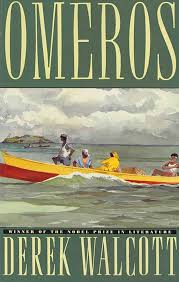About
Author: Derek Walcott (St. Lucia)
Genre: Epic
Setting
Place: St. Lucia, several others
Time: 1970s-1990s
My Rating (see what this means)
My Subjective Rating: 3
My ‘Objective’ Rating: 3.4
Introduction

Omeros, the Nobel winning novel by Derek Walcott, gets its name from the Greek name of Homer. The book recreates Homer’s epic Iliad with St. Lucian characters and also with St. Lucia (the Helen of the Indies) as a character.
A book is packed with Homerian allusions and not-allusions (for Omeros himself is a shape-shifting, time-jumping character in the book) – making it a challenging read. But, thanks to some good reference guides (shmoop, A critical edition of Omeros, by Donald Barnard) I was able to make sense of the story and appreciate the fact that it is a marvellous work.
But I still plan to read the book once again before I will be able to write a more authoritative blog on it.
Summary
Omeros is ambitious to say the least – and it is driven by 4 broad story lines –
- Two friends Achille and Hector and their rivalry over a common love interest Helen
- Philoctete (Achille and Hector’s friend) and his struggle to find the cure for a wound (symbolically linking him to his slave ancestors)
- Major Dennis Plunkett’s quest to find peace – and his fascination with Helen, the woman, Helen of the West Indies (St. Lucia) and the Helen of Troy
- And the narrator – who inserts himself in the story, to make sense of what he is writing and why
All of these stories – dealing with epic themes of their own – progress vs. traditions, wounds of the past and moving on – often cross paths, created Homerian tragedies and are enriched by a plethora of magical realist metaphors – Achille’s delirious journey to his roots in Africa, or the narrator’s journey through Dante’s hell, or Ma Kilman – the bartender and healer’s journey following an ant-trail to find a cure for Philoctete. That makes a richly dense book.
At one point, towards the final chapters – the narrator wonders the point of writing these verses even is – and if the parallels he has drawn from the Greek epic are valid in the first place. I, unfortunately, am not as familiar with Iliad as I would have like to be – to know of this were true – but I know I will have to read the book again to appreciate, not just the fact that it is marvellous, but the marvellousness of the work itself.
Picture Credits:
- Cover Picture: The Gulf Stream, Winslow Homer